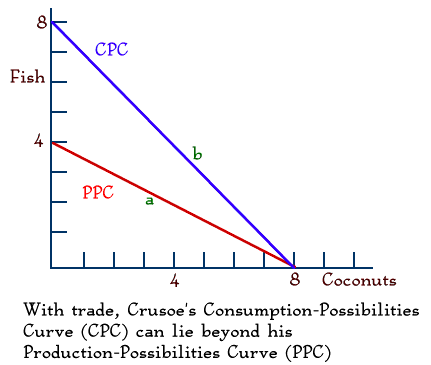Exchange and Consumption
In the last reading, we derived Crusoe's production-possibilities frontier. Now, suppose that civilization arrives in the form of the Friday Trading Post. The trading post trades one fish for one coconut (or one coconut for one fish). Will the existence of the trading post make life better for Crusoe? It will if it gives him more consumption possibilities than his production-possibilities frontier allows him. To see that it does, consider what will happen if Crusoe collects eight coconuts and trades them for fish. He will be able to get eight fish, which is not a possibility that his original budget constraint allowed him. The picture below shows that the consumption-possibilities frontier, which exchange gives him, allows him options that the production-possibilities frontier does not allow.

Suppose that before trade, Crusoe was at point a on his production-possibilities frontier above, and that once trade is possible, he wants to be at point b. In order to get to b, he must devote all his time to gathering coconuts. Some of those coconuts he will consume, but others he gathers only to trade. In order to get to where he wants to be, Crusoe must do something he does not want to do. He must work gathering coconuts.
Exchange requires a person to give in order to get. It constrains people, forcing them to do things that they do not want to do in order to accomplish their goals. Adam Smith wrote about constrained behavior in this way:
"It is not from the benevolence of the butcher, the brewer, or the baker that we expect our dinners but from their regard to their own interest. We address ourselves not to their humanity but to their self love, and never talk to them of our own necessities but of their advantages."
The butcher and baker want to profit from their businesses so that they can obtain material goods for their own use. In the pursuit of this goal, they provide a product to the consumer. If one of these merchants refused to provide a quality product at a reasonable price, consumers could take their money elsewhere. The existence of other sellers provides a limit on each merchant. However, they can at times find ways to "beat the system." They can stop competing and monopolize, charging consumers more in the process. Or they can sell defective merchandise to consumers who think that they are buying quality merchandise.
The system of market exchange is the most studied system of constrained behavior with which we live. There are, however, many other such systems around us. Politicians would be less sensitive to people's desires if they did not have to endure elections. Mothers and fathers who tell their children that they will not get dessert if they do not finish their meal are using this system, as are grade school teachers who tell their students that they will get no recess if they are not quiet. Finally, college students deal with an interesting system of constraint called the "grading system" in their struggle to earn a college degree.
Let us consider how the grading system works under some extreme assumptions. Assume that students want to obtain a college degree but are totally uninterested in learning anything in the process of obtaining that degree. Assume also that the faculty has a goal of increasing student knowledge, and does not care at all whether or not the student does graduate.
The faculty can achieve its goals with the system of tests and grades that is familiar to all college students. This system forces students to learn what the faculty members desire in order to obtain a degree. Whether students are fascinated with what they learn or have no interest in it at all does not matter in this system. In either case, learning must take place.
Or must it? College students have long known that there is in fact a way to "beat the system," that is, one can achieve the goal without performing as the system requires. Students can cheat. When they cheat, students still achieve their goals, but they no longer do those things that they do not want to do. All systems of constrained behavior have ways of "cheating" on the system, and if cheating is too easy, the system will not work well.
If one views college education as a struggle to learn, with grades and degrees as unimportant by-products, cheating should never happen. The fact that cheating does occur in colleges suggests that there is a large element of constrained behavior in college education.
Sometimes, systems of constrained behavior have been consciously designed, but often they have grown up spontaneously, as did the market system. Whether spontaneous or designed, people often try to change how systems work. When a system of constrained behavior is complex, and those making the changes do not fully understand the system, the results of the changes in behavior can seem surprising and unexpected to those making the changes. For example, consider the grading system. If the faculty believed students are motivated only by a love of learning, it might decide to abolish grades. It would be surprised when the amount of learning falls.
When one wants to alter a system of constrained behavior, it is necessary to understand the system. This necessity provides a major demand for economists. Governments often want or need to change incentives in markets, and they often ask economists for predictions about the effects of those changes. And even when they do not ask, economists give answers. A great deal of their scholarly work is concerned with how the system of market exchange works, and what the effects of various changes will be. You will see many examples of economists' concern for the effects of such changes in the various pages at this site. In some of these examples, you will see how useful economists find the simple concepts of budget constraint and production-possibilities frontier.
Copyright Robert Schenk